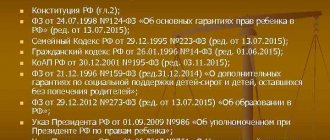What rights does a guardian have?
The rights and obligations of guardians are regulated by Art. 36 Civil Code of the Russian Federation, art. 148.1 of the RF IC, Article 15 of the Federal Law “On Guardianship and Trusteeship” No. 48 of 2008.
In most cases, they are similar to parental rights. The exception is property rights. The legislator provides additional financial incentives for guardians.
Basic rights:
- to raise a minor;
- to provide opportunities to communicate with relatives;
- to receive remuneration (for paid guardianship);
- to receive benefits and financial incentives.
Expert opinion
Stanislav Evseev
Lawyer. Experience 12 years. Specialization: civil, family, inheritance law.
Most of the rights of a guardian are contrasted with responsibilities. For example, a citizen has the right to independently choose the form of education for a child and the educational organization. On the other hand, he is obliged to provide the minor with the opportunity to receive a complete secondary education. Otherwise, responsibility for violating children's rights rests with him.
For education
The main function of the guardian is to provide the child with the opportunity to live and be raised in a family, and not in a specialized organization. A citizen can independently choose methods of education. The key point is respect for children's rights.
In the process of upbringing, a person may adhere to the beliefs of certain religions or atheism. He is absolutely free to choose directions.
However, if a minor was adopted into a family at a conscious age and does not want to support the family’s religion, then violent coercion is not allowed.
To provide opportunities to communicate with family
The ability to maintain communication with relatives is a child’s legal right. However, the guardian has the right to decide whether such communication is harmful to the minor.
The substitute parent is not obliged to provide opportunities for meetings on days convenient for relatives. First of all, he must evaluate the convenience of the situation for the baby.
In addition, a citizen should not bring a child to another locality. Relatives must independently take measures to communicate with the baby.
To receive a reward
If a minor is placed under paid guardianship, the guardian has the right to receive remuneration. Its payment is regulated by the foster family agreement.
The amount of remuneration is established by the legislation of the region. It can be determined for each child adopted for upbringing, or for the foster family as a whole.
Payment is made monthly to the account of the substitute parent. Delay in payment for more than 3 days is unacceptable.
To receive benefits and payments
Guardianship is the most funded type of family arrangement. The guardian receives not only a monthly payment, but also a remuneration (in the case of a paid form of guardianship).
A family can also receive the status of a large family. In this case, they will receive all the benefits intended for large families.
Important! The guardian family does not have the right to receive maternity capital.
Children in their care receive a free gift for the New Year. The region provides wards with free trips. This saves the budget of the substitute parent.
Sanctions applied in case of dishonest fulfillment of guardianship duties
The guardian is responsible for his own actions and the actions of the person under his care. Transactions that result in a decrease in the value of the ward’s property are compensated by a person authorized by the guardianship authorities. A similar situation occurs when damage is caused to 3 persons by a person under guardianship.
PLO employees monitor the conscientious fulfillment of guardianship duties. If selfish actions or careless performance of assigned duties are detected, the guardian may face administrative and criminal liability.
Responsibilities of a guardian over a minor child
The performance of guardianship duties is properly monitored by the guardianship department. In case of non-compliance, the citizen will be held accountable.
The control procedure includes visiting the guardian’s apartment twice a year, as well as receiving a report on the use of the ward’s property. A specialist must also examine the child.
List of responsibilities
| No. | Responsibilities |
| 1 | By content |
| 2 | For the protection of property rights |
| 3 | By cohabitation |
| 4 | For health care |
| 5 | To ensure the right to education |
By content
The guardian is obliged to provide the child with everything necessary for normal development (food, clothing, shoes). To do this, funds are transferred monthly to the nominal account of the substitute parent.
In fact, a citizen does not bear independent costs for the child. They are compensated from the regional budget.
However, the guardian must purchase items to meet the children's needs in a timely manner. Purchases must correspond to the interests of the child, be practical and suitable for the season, age, and size.
In a number of regions, children in their care are provided with free meals in educational institutions. The guardian must apply for this benefit.
For the protection of property rights
A minor may be the recipient of a disability or survivor pension, alimony and other payments. The ward may also own real estate, vehicles and other property. The guardian must control and ensure the safety of the property.
If parents do not pay child support, then the responsibility for collecting funds and monitoring payments rests with the guardian. He must also hold them accountable for failure to comply with a court decision.
Every year, before February 2, a citizen must submit a report on children's property to the guardianship department. It indicates a list of properties, the amount of payments received, as well as taxes paid.
Disposal of children's property (with the exception of benefits, pensions, alimony) is possible only with the permission of the guardianship department.
By cohabitation
The guardian and ward are required to live together. Only after reaching 16 years of age can a child live separately. But the guardianship department must issue an order on the possibility of separation.
Specialists from the guardianship department must regularly visit the home of the substitute parent and check the place of residence of the minor. A report on visits is drawn up.
The document is prepared in 2 copies. 1 of them is given to the guardian. A citizen can challenge the contents of the act in court.
For health care
Since 2010, all wards are required to undergo an annual medical examination. The guardian must ensure that the child has the opportunity to attend a medical examination.
The procedure includes research, examination by specialists and ultrasound diagnostics. The procedure is mandatory.
In addition, in the event of injury or illness, the guardian is obliged to provide the child with qualified medical care. When accepting a disabled person into the family, it is necessary to provide for the possibility of providing for special needs in advance.
To ensure the right to education
The minor must receive complete secondary education. The responsibility for providing such an opportunity rests with the guardian.
A citizen must provide the child with:
- school clothes;
- sports uniform;
- office;
- textbooks;
- a place to do homework.
The guardian is also responsible for monitoring the child's proper attendance and behavior at school.
What is meant by the word "guardian"?
A guardian is an adult citizen of the Russian Federation who wishes to take on the responsibilities of caring for and raising a person in need of guardianship. The role of wards are adults who are deprived of legal capacity by a court decision, and children under 18 years of age and temporarily living in an orphanage or shelter. Mentally ill citizens are also considered incompetent. They are awarded the first disability group. Guardianship is also established for elderly people over 80 years of age and pensioners in need of constant care. The form of guardianship is as follows:
- Paid guardianship is characterized by certain monetary payments from the state as a reward for the performance of one’s duties. How much the guardian will receive depends on the agreement drawn up between the parties and the ward. If the ward is disabled or requires constant care that does not allow him to work, then a small compensation is allocated from the budget. In foster care and foster families, guardians even receive certain amounts every month for accepting a child from an orphanage for upbringing. Maintenance costs are compensated by a monthly allowance and other payments guaranteed by the state to orphans.
- Gratuitous guardianship occurs in most cases. The guardian is only provided with funds for the maintenance of the ward. They will have to be reported annually to the PLO.
It is generally accepted that guardianship should be selfless. Any actions aimed at enriching oneself at the expense of the ward’s property or money are punishable by law. The guardian may be deprived of benefits, bonuses, fined, or even released from guardianship duties.
The property of the person under guardianship is described. If necessary, a trust agreement is drawn up. Guardianship officials monitor the disposal of the ward's property.
Liability of Trustees
Liability is provided for failure to fulfill the duties of a guardian. Unfortunately, in [current_date format='Y'] there is no provision for liability for the main violation - the return of a child to an organization for orphans. Even if a citizen has spent all the minor’s funds and returned him to the orphanage, no punishment is provided.
In 2021, the following liability options for a guardian are provided:
- for improper performance of duties;
- for the actions of the ward.
For improper performance of duties
In case of improper performance of duties, the substitute parent may be held liable under Art. 5.35 Code of Administrative Offenses of the Russian Federation. The maximum penalty in 2021 is 500 rubles.
If a relative of a child goes to court to determine the order of communication with a minor, then the citizen is obliged to comply with the court decision. Otherwise, a fine in the amount of 2,000 to 5,000 rubles is applied as punishment.
In case of repeated prosecution under Art. 5.35 of the Code of Administrative Offenses of the Russian Federation, the guardianship department may raise the issue of removing a citizen from performing duties. In this case, the minor is placed in a specialized organization. And the guardian is subject to a lifelong ban on accepting children into the family.
For the actions of the ward
If a student, through his actions, causes damage to someone else’s property, then responsibility rests with the guardian. The exception is the situation. When the ward is over 16 years old.
In this case, he has reached the age of administrative responsibility. But his guardian still decides financial issues for him.
If a child commits a crime, he is personally held criminally liable. And compensation for damage is assigned to the substitute parent.
What is the difference between guardians and trustees?
The essence of guardianship and trusteeship is to care for the ward and protect his interests. The voiced forms of patronage differ only in some points:
- A guardian is appointed for minors under 14 years of age and incompetent citizens. He is obliged to act on behalf of the ward in all legally significant matters (choose a medical and educational institution, participate in court hearings, pay for services).
- A guardian is required for children from 14 to 18 years of age and partially incapacitated people. The duties of the representative of the guardianship authorities include monitoring the observance of the rights of the ward and protecting his interests. From the age of 16, the person under guardianship has the right to ask to live separately. If a teenager or partially incapacitated citizen wants to sell his property, he must obtain the approval of a trustee. Both parties will be involved during the transaction.
Duty to care for the health and physical development of the child
The guardian (trustee) is obliged to monitor the child’s health and his physical development (clause 6 of article 148.1 of the RF IC). The law does not specify how such care is carried out, but it should primarily be of a preventive nature. Obviously, the guardian must monitor the minor’s nutrition and, if necessary, provide medical care (either independently or by involving a specialist).
For normal development, a child needs physical exercise and stress. The guardian is obliged to ensure that his ward engages in physical education or attends special sports sections. Like nutrition control, this is especially important now as children are increasingly overweight.
Right to benefits
For performing an important and honorable duty, the guardian is provided with a number of benefits. Rights of a guardian in the field of labor law:
- The employer's obligation to establish a part-time working day at the request of the guardian (Article 93 of the Labor Code of the Russian Federation);
- The opportunity to go on leave to care for a child who has not reached the age of 3 years (Articles 256, 264 of the Labor Code of the Russian Federation);
- 4 additional paid days of leave if the child under care is disabled (Article 262 of the Labor Code of the Russian Federation).
In accordance with Art. 218 of the Tax Code of the Russian Federation, a guardian (trustee) can receive a standard double tax deduction.
As a general rule, a guardian performs his duties without providing payment. But the law knows two forms of paid guardianship: foster family and patronage. In paid guardianship, the guardian receives payment for the performance of his duties.
It is important to note that the guardian does not inherit from the ward (and vice versa).









